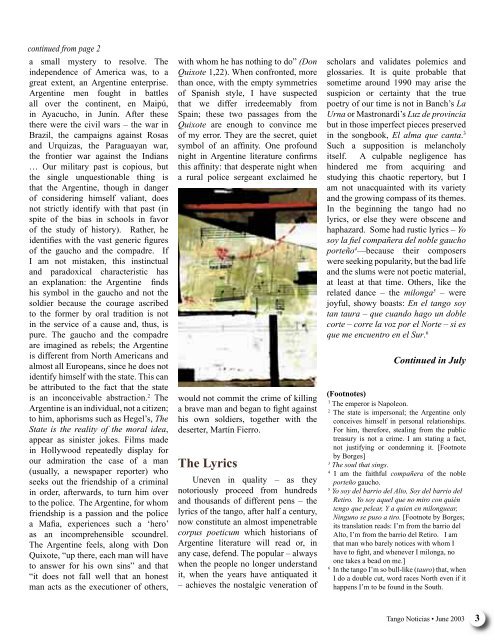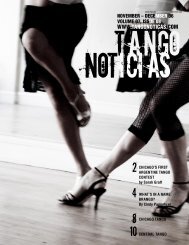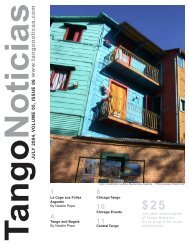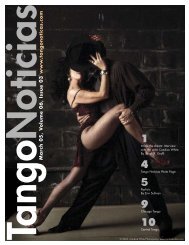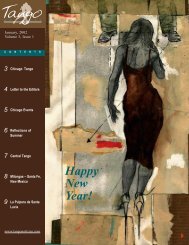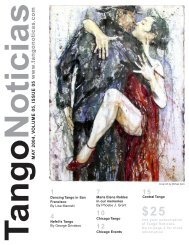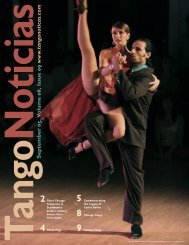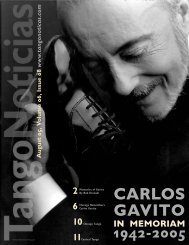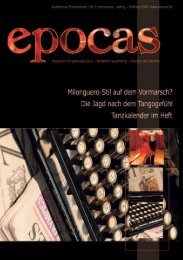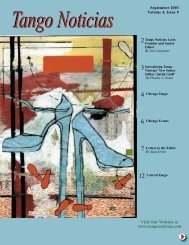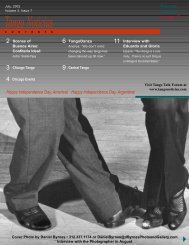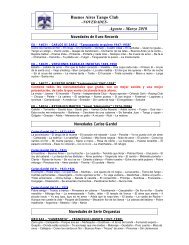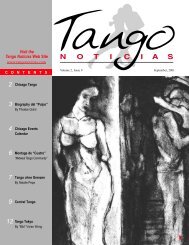You also want an ePaper? Increase the reach of your titles
YUMPU automatically turns print PDFs into web optimized ePapers that Google loves.
continued from page 2a small mystery to resolve. Theindependence of America was, to agreat extent, an Argentine enterprise.Argentine men fought in battlesall over the conti nent, en Maipú,in Ayacucho, in Junín. After thesethere were the civil wars – the war inBrazil, the campaigns against Rosasand Urquizas, the Paraguayan war,the frontier war against the Indians… Our military past is copious, butthe single unquestionable thing isthat the Argentine, though in dangerof considering himself valiant, doesnot strictly identify with that past (inspite of the bias in schools in favorof the study of history). Rather, heidentifies with the vast generic figuresof the gaucho and the compadre. IfI am not mistaken, this instinctualand paradoxical characteristic hasan explanation: the Argen tine findshis symbol in the gaucho and not thesoldier because the courage ascribedto the former by oral tradition is notin the service of a cause and, thus, ispure. The gaucho and the compadreare imagined as rebels; the Argentineis different from North Americans andalmost all Europeans, since he does notidentify himself with the state. This canbe attributed to the fact that the stateis an inconceivable ab straction. 2 TheArgentine is an individual, not a citizen;to him, aphorisms such as Hegel’s, TheState is the reality of the moral idea,appear as sinister jokes. Films madein Hollywood repeatedly display forour admiration the case of a man(usually, a newspaper reporter) whoseeks out the friendship of a criminalin order, afterwards, to turn him overto the police. The Argentine, for whomfriendship is a passion and the policea Mafia, experiences such a ‘hero’as an incomprehensible scoundrel.The Argentine feels, along with DonQuixote, “up there, each man will haveto answer for his own sins” and that“it does not fall well that an honestman acts as the executioner of others,with whom he has nothing to do” (DonQuixote 1,22). When confronted, morethan once, with the empty symmetriesof Spanish style, I have suspectedthat we differ irredeemably fromSpain; these two passages from theQuixote are enough to convince meof my error. They are the secret, quietsymbol of an affinity. One profoundnight in Argentine literature con firmsthis affinity: that desperate night whena rural police sergeant ex claimed hewould not commit the crime of killinga brave man and began to fight againsthis own soldiers, together with thedeserter, Martín Fierro.The LyricsUneven in quality – as theynotoriously proceed from hundredsand thou sands of different pens – thelyrics of the tango, after half a century,now constitute an almost impenetrablecorpus poeticum which historians ofArgentine literature will read or, inany case, defend. The popular – alwayswhen the people no longer understandit, when the years have antiquated it– achieves the nostalgic veneration ofscholars and validates polemics andglossaries. It is quite probable thatsometime around 1990 may arise thesuspicion or certainty that the truepoetry of our time is not in Banch’s LaUrna or Mastronardi’s Luz de provinciabut in those imperfect pieces preservedin the songbook, El alma que canta. 3Such a supposition is melancholyitself. A culpable negligence hashindered me from acquiring andstudying this chaotic repertory, but Iam not unac quainted with its varietyand the growing compass of its themes.In the be ginning the tango had nolyrics, or else they were obscene andhaphazard. Some had rustic lyrics – Yosoy la fiel compañera del noble gauchoporteño 4 —because their composerswere seeking popularity, but the bad lifeand the slums were not poetic material,at least at that time. Others, like therelated dance – the milonga 5 – werejoyful, showy boasts: En el tango soytan taura – que cuando hago un doblecorte – corre la voz por el Norte – si esque me encuentro en el Sur. 6Continued in July(Footnotes)1The emperor is Napoleon.2The state is impersonal; the Argentine onlyconceives himself in personal relation ships.For him, therefore, stealing from the publictreasury is not a crime. I am stating a fact,not justifying or condemning it. [Footnoteby Borges]3The soul that sings.4I am the faithful compañera of the nobleporteño gaucho.5Yo soy del barrio del Alto, Soy del barrio delRetiro. Yo soy aquel que no miro con quiéntengo que pelear, Y a quien en milonguear,Ninguno se puso a tiro. [Footnote by Borges;its translation reads: I’m from the barrio delAlto, I’m from the barrio del Retiro. I amthat man who barely notices with whom Ihave to fight, and whenever I milonga, noone takes a bead on me.]6In the tango I’m so bull-like (tauro) that, whenI do a double cut, word races North even if ithappens I’m to be found in the South.Tango Noticias • June 20033


